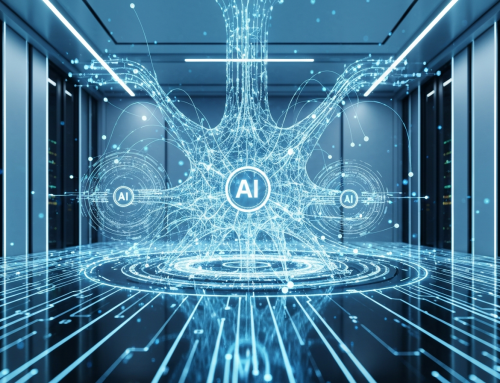The Dawn of Generative AI: Why 2025 Demands a Strategic Approach
The landscape of business is undergoing an unprecedented transformation, with Generative AI (GenAI) emerging not merely as a technological advancement, but as a critical strategic imperative for 2025 and beyond. What was once considered experimental is now a foundational element of competitive advantage. Industry leaders and executives across sectors are recognizing that a proactive Generative AI Business Strategy is no longer optional, but essential for growth, efficiency, and sustained relevance. The pace of AI innovation is accelerating, far surpassing previous technological shifts, compelling organizations to adapt their strategies with unparalleled speed.
Studies indicate that nearly 90% of business leaders view AI as fundamental to their company’s strategy today or in the near future. This shift reflects an urgent need to move beyond isolated experiments and fully integrate GenAI into enterprise-wide initiatives. Organizations are now grappling with how to harness GenAI to reshape industries, redefine business models, and create new value streams at a rate previously thought impossible.
Defining Your Generative AI Business Strategy: From Hype to Tangible ROI
Moving past the initial hype, a successful Generative AI Business Strategy must be anchored in tangible return on investment (ROI). While many organizations have experimented with GenAI, translating ambition into measurable impact remains a significant challenge. However, early adopters who strategically integrate GenAI are achieving breakthrough results, with some reporting quality and productivity gains exceeding 40%.
Defining success for GenAI initiatives requires clear, business-driven objectives rather than focusing solely on technological novelty. Companies must identify specific business problems that GenAI can solve, such as enhancing customer satisfaction, increasing market penetration, or advancing product innovation. According to The Hackett Group, these are precisely the top three enterprise business objectives for 2025. Measuring success goes beyond project volume; it centers on business metrics like revenue growth, cost efficiency, and customer success, with specific attribution models tied to each use case.
The journey to measurable ROI begins with a rigorous approach. It requires setting clear key performance indicators (KPIs) upfront, establishing baselines, and then meticulously tracking post-implementation performance. This disciplined approach ensures that GenAI investments are not just technologically impressive, but financially justifiable and strategically impactful.
Core Pillars of an Effective Generative AI Business Strategy: Governance, Integration, and Value Capture
An effective Generative AI Business Strategy rests upon several core pillars that ensure sustainable value and responsible deployment. These include robust governance, seamless integration, and efficient value capture mechanisms.
- Governance: Strong AI governance is paramount. This encompasses policies, processes, and technology necessary for developing and deploying AI systems responsibly. CEO oversight of AI governance is strongly correlated with higher self-reported bottom-line impact. This also means actively managing risks related to inaccuracy, cybersecurity, and intellectual property infringement. Organizations must ensure systematic, transparent approaches to confirming sustained value from their AI investments while managing the risks of large-scale deployment.
- Integration: GenAI solutions rarely operate in isolation. Their true power is unlocked when seamlessly integrated into existing business operations and workflows. This requires rethinking operating models, data management, and workforce capabilities. Cross-functional adoption is crucial, with technology leaders collaborating closely with business units to understand their priorities and facilitate smooth AI integration.
- Value Capture: The ability to capture tangible benefits—such as revenue growth, cost savings, and quality improvements—is the ultimate measure of a GenAI strategy’s success. This demands moving beyond one-off solutions to deep business process changes, new skill sets, and organizational structures. By focusing on high-impact use cases and establishing clear metrics for ROI, businesses can ensure their GenAI initiatives deliver measurable value. Many organizations, despite significant investments, still struggle to accurately measure the ROI of their GenAI endeavors, underscoring the need for a focused approach on quantifiable outcomes.
Strategic Implementation: Integrating Generative AI into Business Operations and Automated Workflows
Strategic implementation is where a Generative AI Business Strategy moves from concept to reality, embedding AI into the fabric of daily operations and creating automated workflows that drive efficiency and innovation. This involves a fundamental reimagining of core processes.
Instead of simply retrofitting AI into existing workflows, businesses should step back and optimize processes for GenAI integration from the ground up. This involves mapping current workflows, identifying pain points, and brainstorming how AI can eliminate friction. For instance, AI-driven systems and agentic workflows can quickly analyze vast datasets, automate complex tasks, and enable real-time decision-making at unprecedented scale. This is not about incremental changes, but about transformational shifts.
Key areas for integration include:
- Customer Service: AI-powered chatbots and virtual assistants can handle routine queries, freeing human agents for complex issues, leading to faster response times and improved customer satisfaction.
- Marketing and Sales: GenAI can automate content creation (blogs, social media posts, ad copy), generate creative design support, and enable hyper-personalized marketing campaigns, boosting conversion rates and engagement.
- Data Analysis and Knowledge Management: AI can summarize complex datasets into actionable insights, automate reporting, and create accessible knowledge bases, empowering employees with effortless access to crucial information.
- Software Engineering: AI tools assist developers with faster coding, debugging, and testing, streamlining the entire software development lifecycle and automating technical documentation.
- Supply Chain Management: GenAI enhances predictive accuracy for demand forecasting, optimizes inventory levels, and facilitates long-term scenario planning.
The rise of AI agents is a particularly significant aspect of this integration. These autonomous agents can perform tasks with minimal human intervention, from handling customer inquiries to generating first drafts of software code. PwC predicts that AI agents could easily double the knowledge workforce, transforming speed to market, customer interactions, and product design. Businesses that plan for a blended digital and human workforce, where people orchestrate teams of agents, will be best positioned to capitalize on this trend.
Mitigating Risks and Ensuring Responsible AI Deployment: A Strategic Imperative
A comprehensive Generative AI Business Strategy must prioritize mitigating risks and ensuring responsible AI deployment. The rapid advancement of GenAI introduces a unique set of challenges that, if not addressed proactively, can erode trust, damage reputation, and hinder progress. Gartner emphasizes that preparing to assess and mitigate a range of AI risks—regulatory, reputational, and competency-related—is crucial.
Key risks include:
- Inaccuracy and Bias: GenAI models, if trained on biased datasets, can perpetuate inequalities or produce false outputs. Organizations must implement robust guardrails, conduct impact assessments, and ensure algorithmic processes are explainable and transparent.
- Cybersecurity Threats: GenAI tools can inadvertently empower malicious actors to craft more convincing phishing scams or malware. Businesses need to enhance their security operations and adopt explainable AI to ensure transparency in decision-making.
- Intellectual Property and Copyright: Generative models could inadvertently produce outputs resembling third-party content, leading to legal disputes. Staying informed about evolving regulations and implementing safeguards to protect intellectual property are essential.
- Data Privacy: Confidential information entered into public GenAI applications can be stored and used for model training, posing significant privacy concerns. Stringent cybersecurity protocols and compliance with regulations like GDPR are critical.
Responsible AI means developing and deploying systems with fairness, accountability, and transparency at their core. This is not just a compliance issue; it’s a strategic imperative that builds stakeholder trust and long-term viability. Organizations that embrace ethical AI frameworks from the outset will facilitate faster progress and avoid significant setbacks. Deloitte highlights that investing in efforts to strengthen organizational culture and trust at the beginning of the GenAI journey can reduce negative impacts on morale and set the organization up for stronger growth.
Cultivating an AI-Ready Workforce and Leadership for Generative AI Success
The success of any Generative AI Business Strategy hinges on cultivating an AI-ready workforce and leadership. GenAI has the potential to automate work activities that absorb a significant portion of employees’ time, necessitating a profound shift in skills and roles. McKinsey’s research indicates that GenAI could impact knowledge workers with higher wages and educational requirements most significantly.
Preparing employees for AI adoption involves a multi-faceted approach:
- Skills Gap Analysis and Reskilling: Conduct analyses to identify reskilling needs as job roles evolve. Provide training in digital skills like data analysis, prompt engineering, and critical thinking, alongside soft skills such as creativity and problem-solving.
- Change Management: Offer workshops focused on leading people through organizational AI transformation, addressing fears of job displacement, and guiding teams through adjustments. Leaders must communicate clearly that AI is meant to augment human capabilities, not replace them, unless a strategic decision for replacement is carefully managed.
- Continuous Learning Culture: Foster an agile culture obsessed with continuous learning and improvement. This means implementing feedback loops for AI system performance, encouraging brainstorming for new use cases, and staying updated on the latest advancements.
- Human-AI Collaboration: Design workflows around seamless human-AI collaboration, where humans handle exceptions and creative tasks while AI takes on rules-based or repetitive work. Appoint designated AI trainers and institute human-in-the-loop checks before deploying AI to production. As Deloitte’s research indicates, organizations where leaders focus on strengthening trust and using GenAI as part of a larger innovation strategy can keep workers inspired rather than fearful.
Leadership plays a critical role in modeling new ways of working with AI and providing assurance that AI is meant to enhance people’s value. This includes personal involvement in core technology choices and guiding AI teams to ensure tool selection aligns with broader business goals, risk considerations, and scalability. By proactively investing in talent development and fostering a culture of adaptability, businesses can harness the full potential of their human and AI workforces.
The Road Ahead: Evolving Your Generative AI Business Strategy with AI Agents and Custom Solutions
As organizations look to the future, evolving their Generative AI Business Strategy will involve moving beyond foundational applications to embrace advanced concepts like AI agents and custom solutions. The landscape of AI is continuously pushing boundaries, with emerging trends poised to further transform business strategy.
One significant trend is the rise of Agentic AI. Unlike traditional GenAI, Agentic AI systems not only “think” but also “act,” setting and achieving goals independently, making real-time decisions, and adapting to dynamic environments with minimal human intervention. Deloitte predicts that 25% of enterprises using GenAI will deploy AI agents in 2025, growing to 50% by 2027. These autonomous agents will play a pivotal role in transforming enterprise operations, enabling businesses to tackle intricate challenges collaboratively and in real time.
Furthermore, the focus will intensify on personalized AI systems tailored to individual user preferences and knowledge-centric organizations. This means leveraging GenAI to effectively capture and structure internal knowledge in AI-ready formats, creating intuitive AI interfaces, and empowering employees with smarter tools for collaboration and decision-making.
The road ahead demands continuous innovation and a strategic commitment to future-proofing. This involves:
- Identifying Visionary Renewal Opportunities: Beyond incremental improvements, businesses must outline distinctive and transformative pathways to unlock GenAI’s full potential, exploring entirely new market segments and radically different ways of organizing their businesses.
- Balancing Short-term and Long-term Objectives: Managers must simultaneously address immediate priorities, such as upskilling and experimentation, with long-term goals like business model innovation and strategic repositioning. It is not an “either-or” but a “both-and” scenario.
- Focusing on Scaling and Impact: Many AI projects remain in pilot purgatory. Prioritizing the elimination of bottlenecks to scaling—including access to data, technical infrastructure, talent, and funding—is crucial for maximizing long-term ROI.
- Embracing Custom Solutions: While general-purpose GenAI models are widely available, creating bespoke solutions tailored to an organization’s unique data and needs will provide a more sustainable competitive advantage.
The era of GenAI is just beginning, and the companies that consistently prove and improve ROI on AI will not only justify their investments but also fund further innovation, distancing themselves from competitors. By adopting a disciplined yet agile approach, businesses can confidently shape their future and unlock true potential through a well-crafted Generative AI Business Strategy.
Ready to implement a strategic Generative AI approach for your business? Connect with Idea Forge Studios today for a personalized consultation on your web development, e-commerce, or digital marketing needs. Schedule a discussion, call us at (980) 322-4500, or email us to get started!








Get Social